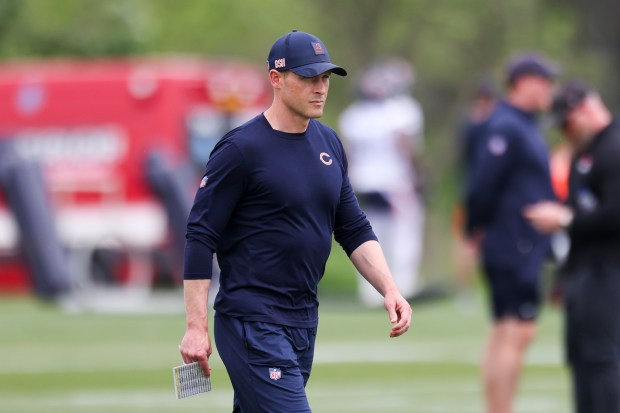The storied Union League Club of Chicago is selling its two most valuable paintings to raise money for a planned $10 million renovation of its nearly century-old Loop building.
The artwork includes a prized painting by French impressionist Claude Monet, “Apple Trees in Blossom,” which has been displayed by the club since it was purchased in 1895.
The club rejected an offer to sell the painting for $7.2 million three years ago as it struggled with pandemic operating losses and shrinking membership.
“We believe that now’s the time to raise capital,” said Frank Devincentis, 44, a board vice president heading up the club’s renovation task force. “Rather than impose on our existing members with a one-time assessment, we believe that raising the funds through the sale of some art is most appropriate.”
In addition to the Monet work, the club is selling “Land of Manana,” a Native American scene painted in 1917 by Walter Ufer, a German-born, Kentucky-raised artist who worked for a time in Chicago, but made his mark with depictions of the Southwest. The club has hired New York-based Winston Art Group to handle the sale of both paintings.
The proceeds will be used to fund “Project Burnham,” a multiyear reinvestment in the private club, which has been a members-only Chicago social institution since 1879. The 330,000-square-foot high-rise clubhouse at 65 W. Jackson, built in 1926, will undergo significant renovation of its180 guest rooms, event and dining spaces, expansive athletic facilities and infrastructure.
The Union League Club has one of the largest private art collections in the Midwest, with more than 700 paintings, sculptures, drawings, prints and photographs. None is more esteemed than its early Monet, which was purchased by a club member from the Art Institute for $500 in 1895.
Completed in 1872, “Apple Trees in Blossom” captures a bucolic French lane in springtime meandering through blooming white foliage. The 23-by-29-inch painting was loaned to the Art Institute for a 2020 Monet exhibition, but for much of its history has been quietly tucked away in a second floor cove at the Union League Club.
The work has recently been pulled down in preparation for the sale, said Devincentis, a managing director with Morgan Stanley and a 20-year club member.
The art sale was precipitated by the pandemic, a catalyst for accelerated decline at some of Chicago’s oldest and most exclusive private clubs. For example, the Standard Club, long the social nexus for Chicago’s Jewish elite, shut down amid dwindling membership and financial difficulties in May 2020.
The Union League Club was not immune to the same financial challenges.
In 2020, the club decided to sell the Monet and other paintings as its operations struggled during the pandemic, losing $400,000 a month and hundreds of members. But a disputed deal to sell the work to an Australian art dealer for $7.2 million ended in Cook County Circuit Court, where a judge ruled in March 2021 the Union League Club was not bound by an agreement to complete the transaction.
Three years later, the club is hoping its Monet is worth significantly more money.
“It is in excess of that $7.2 million figure,” Devincentis said. “Much greater excess.”
The Union League Club’s influential membership once included such luminaries as architect Daniel Burnham, whose 1909 Plan of Chicago shaped the development of the city, its parks system and its open lakefront.
Invoking Burnham, the club is looking to both upgrade its aging facilities and rebuild its declining base, which has recovered to about 2,000 members but remains below its pre-pandemic levels, Devincentis said.
Selling its most prominent pieces of art to fund renovation, he said, is an investment in the post-pandemic future of the club, given that Chicago offices still hover at 50% of their 2019 occupancy, and social settings increasingly serve as co-working spaces for hybrid and fully remote employees.
“If a city club like ours wants to stay relevant and stay as a premier value to its members, it’s going to need to reinvest,” Devincentis said. “Many people…are working in a world where perhaps their employer has reduced their footprint in terms of offices, so we become a great option for them. They can come to the club, hold meetings, be in a beautiful place, use all the member facilities and get their work done.”
rchannick@chicagotribune.com




